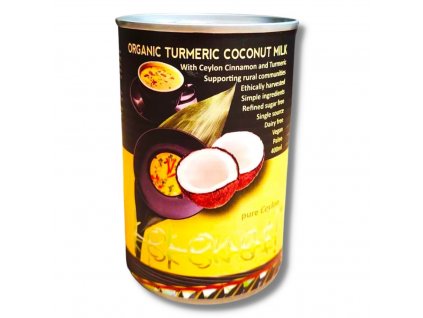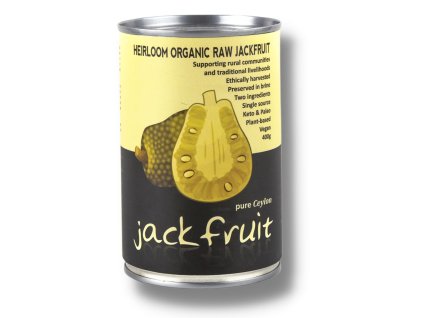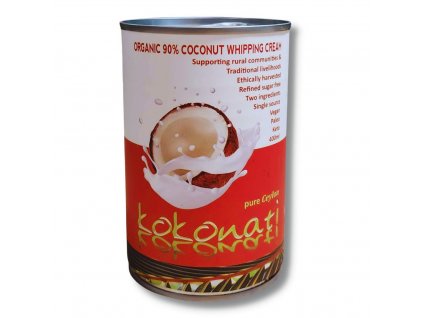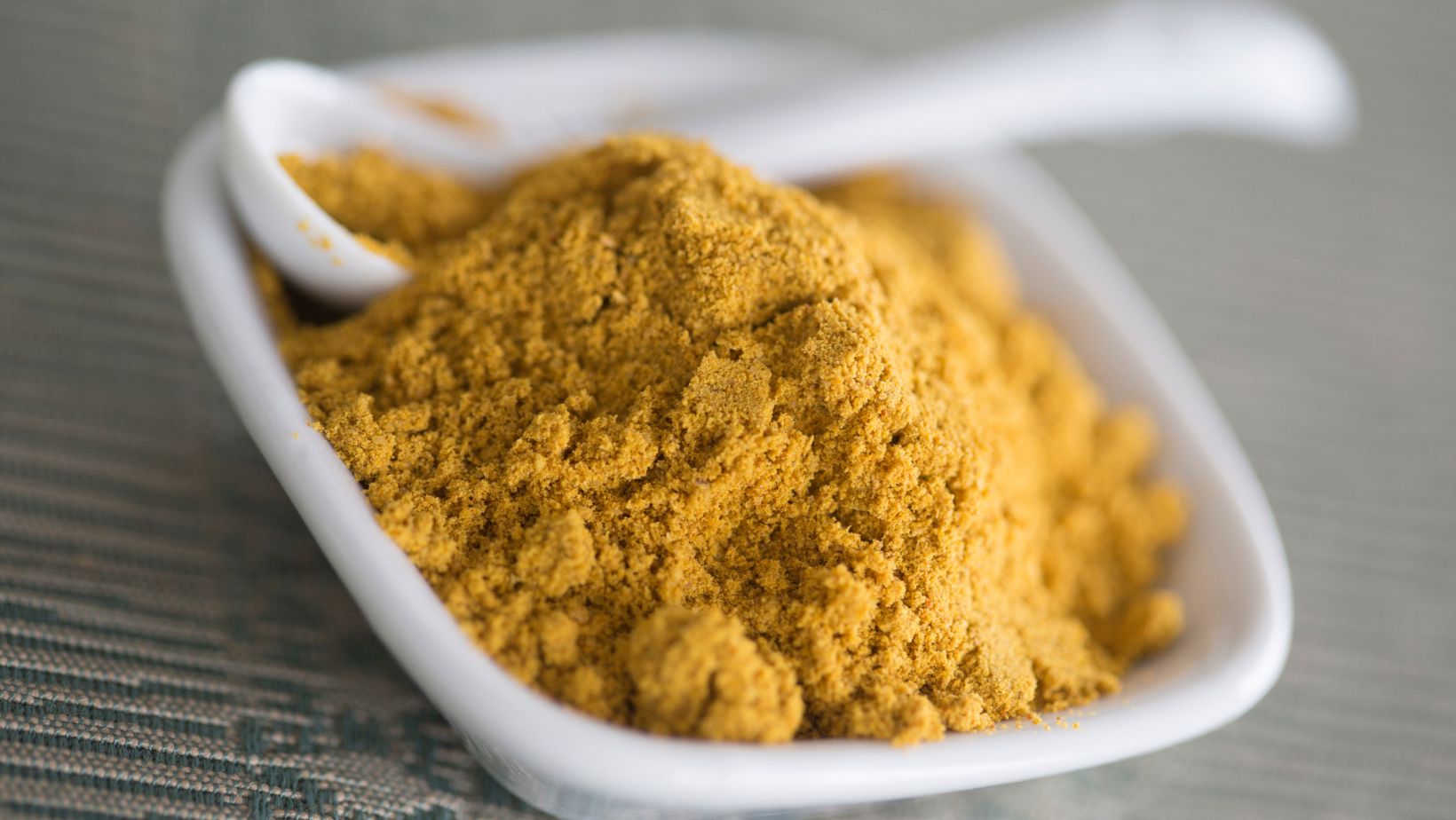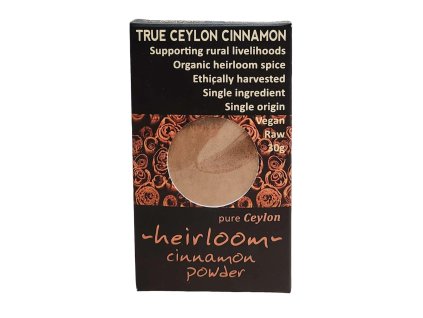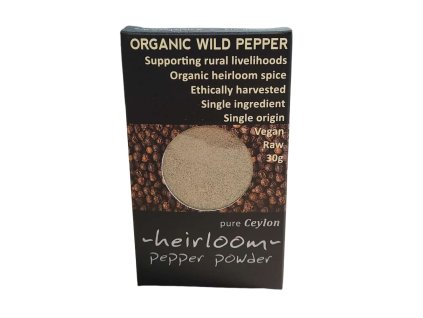Ceylon Roasted Curry Spice čerstvý - sbíraný a sušený v době sklizně - 30 g

Unikátní produkty
Dovážíme originální zahraniční výrobky, které lokální trh postrádá

Balíme rychle a ekologicky
Odesíláme do 24-48 hodin, vše v recyklovaných materiálech

Záruka kvality
Značky vybíráme srdcem a řídíme se heslem – raději méně, ale kvalitně

Doprava zdarma
Utraťte min. 4000 Kč a neplaťte poštovné do Balíkovny
Related products
Product detailed description
Why buy
Ceylon Kokonati introduces you to Sri Lankan spices that are literally heirlooms that have been cultivated in their gardens since ancient times. A fresh curry made from this spice can elevate an everyday meal to a whole new level.
Roasted curry - this version of curry is mainly used in Ceylonese cuisine. Roasted curry is mainly used as an accompaniment to meat dishes and seafood. It is also added to richly spiced vegetable recipes such as Baby Jackfruit Curry and Bitter Gourd Curry.
Sri Lanka, known as the Spice Island, was historically attractive to Western nations because of its abundance of spices. This love basically continues to this day.
The combinations of Sri Lankan spices, which draw on centuries of local Ayurvedic knowledge, have many health benefits such as reducing inflammation, boosting immunity and even aiding digestion.
Cottage Industry or home production
The cottage industry supports the traditional livelihoods of villagers in rural Sri Lanka. Sri Lankan spices are harvested using traditional methods to retain their natural strength and flavour, thanks to the knowledge and experience of multi-generational millers.
This traditional production allows villagers to use their age-old knowledge and experience to survive in this modernized and mechanized manufacturing world by producing 100% natural unrefined spice products.
Backed by the experience of generations of pickers and packaged in an ISO certified mill and organic processing, spice production plays a vital role in the employment, wealth and prosperity of a rural village community.
Depending on the harvest and the season, each batch of Ceylon turmeric may vary in colour and to a lesser extent taste, as it is a natural product without any synthetic substances, refining, additives or preservatives.
These unnecessary substances are commonly used to standardise the product in large-scale commercially grown and heavily processed spices.
Ingredients
Roasted *Ceylon cinnamon (spikes), *coriander seeds, *green cardamom seeds, *cumin seeds, *fennel seeds, * fenugreek seeds, *cloves, *curry leaves, *curcuma, *black peppercorns.
* BIO component
It is grown in Ceylon (Sri Lanka).
What is the difference between Indian and Sri Lankan curry powder?
The main difference between Sri Lankan and Indian curry powder lies in the ingredients used and their quantities. Indian curry powder is milder and less strong than traditional Sri Lankan curry powder.
An integral part of Indian curry powder is turmeric. And we don't usually see the addition of pandan leaves, coconut, uncooked rice or lentils. However, the use is quite similar in both spice mixes, as the primary purpose of both is to prepare curries.
Is Ras el Hanout the same as Sri Lankan curry?
The simple answer is: No. Ras el Hanout comes from Mediterranean cuisine, while Sri Lankan curry powder belongs to Southeast Asian cuisine. They come from different cultural backgrounds, and the list of ingredients also varies greatly from variant to variant.
In Ras el Hanout, one does not usually encounter fennel seeds, which can be spicier depending on the amount of exotic spices used. At the same time, depending on the number of red chillies used, Sri Lankan curry can also be hotter than Ras el Hanout.
What is dried Ceylon curry spice?
Honestly, curry powder means everything to Sri Lankans! This is one of the world's most robust spice blends, made from a long list of spicy spices and fragrant herbs.
If you ever have the opportunity to visit the kitchen of a Sri Lankan household, the first thing you will notice is one or more jars of curry spices.
There are several types of curry powder that are inherent to Ceylonese cuisine. Roasted and unroasted curry takes an important place. And you'll also see Jaffna curry powder and chicken curry powder in their homes.
Each of these variations goes into the ingredients and ratios used. However, every Sri Lankan chef has his own way of preparing curry powder.
The taste and robustness thus vary widely from recipe to recipe. You can buy it in most Asian stores or supermarkets under several Sri Lankan brands. In the meantime, it is also possible to make your own fresh batch of curry powder.
Linking curry spices to Sri Lankan households.
As already indicated, taste and robustness vary widely depending on the individual recipes. This spice blend is associated with the ancient Sri Lankan culture. Roasted curry is called "Badapu Thuna Paha" (බැදපු තුන පහ) and unroasted curry is called "Amu Thuna Paha" (අමු තුන පහ).
Generally, the term "Thuna Paha" is used to refer to curry in Sri Lankan households, which translates to "three fives". "The 'three' refers to the three main ingredients you will find in any variation of curry powder: coriander, fennel and cumin.
At the same time, "five" refers to the five typical aromatics found in this spice blend, such as cloves, cardamom, cinnamon, fenugreek seeds and curry leaves. Sri Lankans also refer to this spice blend as "Sarakku Kudu" (සරක්කු කුඩු). The meaning of this term is not known, but it is thought that it could be derived from a South Indian word.
The ancient Sri Lankans believed that the medicinal properties of the spices and herbs used in this spice blend had a powerful healing effect on many ailments. However, curry is a staple of authentic Sri Lankan dishes, important as a flavour enhancer and sometimes as a seasoning.
You can read more about the excellence of the real Ceylon spices in this article: https://spicerally.com/top-11-essential-ceylon-spices/
Usage:
Curry spices can be used in different ways.
- To prepare a traditional Sri Lankan meat or vegetable curry dish.
- For flavouring rice, yoghurt, hummus, fresh vegetables, beans or cabbage.
- As a dry rub for grilling.
The mixture is slightly spicy, so feel free to add chilli (fresh or dried) according to your taste preferences.
For a quick curry, just add your choice of vegetables, greens, lentils and/or protein with water (or coconut milk/yogurt for a richer base). Bring to a boil and cook until cooked.
Preparation of traditional Sri Lankan curry:
- Sauté chopped onion, garlic, ginger and tomatoes (optional) in oil until they begin to soften.
- Add curry powder and chili powder (optional) as needed.
- Add the vegetables and protein and mix.
- Add coconut milk, cream or already prepared curry sauce. You can find everything here.
- Cook until the vegetables or protein used are done.
- Season with salt.
.jpg)
Use this method to prepare flavorful lentils, beans, rice, pasta or noodles:
- Tip - start with 1/2 to 1 teaspoon of curry powder and add to taste once cooked.
Recommended ratio of curry powder use:
- 1 teaspoon per 1 cup of red lentils / 200 g protein / 300 g vegetables.
- 2 teaspoons per 250 g rice/pasta/protein
- As a dry rub: massage a little oil into chopped vegetables, tofu, halloumi, meat/fish and lightly dust with curry powder before baking, grilling or slow cooking.
What is a native (heirloom) seed variety?
A so-called heirloom variety (whether of plants, seeds, fruits or vegetables) is an open-pollinated variety that was commonly cultivated in earlier times in human history, but is not used in modern large-scale agriculture because of the cartel-like behavior of a large corporation like Monsanto, which is behind the destruction of ancient seeds and the food chain in general across the planet.
See the document below. And here is a link to the website of a Canadian university, The University of British Columbia, which explains briefly what it is. If you do not speak English, use the online translator: deepl.com
We have translated this paragraph from the English Wikipedia:
Before the industrialisation of agriculture, a much wider variety of plant foods were grown for human consumption, mainly because farmers and gardeners saved seeds and cuttings for future planting. From the 16th century to the early 20th century, the diversity was enormous.
The old nursery catalogues were full of plums, peaches, pears and apples of many varieties and the seed catalogues offered legions of vegetable varieties. These catalogues were used to sell and trade valuable and carefully selected seeds along with useful advice on growing.
Since the Second World War, agriculture in the industrialised world has consisted mainly of food crops grown on large monoculture plots. Only a few varieties of each type of crop are grown to achieve the greatest consistency.
These varieties are often selected for their productivity and their ability to ripen at the same time and withstand mechanical harvesting and transport across borders, as well as their resistance to drought, frost or pesticides. This form of agriculture has led to a 75% decline in the genetic diversity of crops.
Although heirloom or heirloom cultivation has retained its place in local communities, it has seen a resurgence in recent years in response to the trend towards industrial agriculture.
In the southern hemisphere, heirloom plants are still widely cultivated, for example in home gardens in South and Southeast Asia. Before the Second World War, most of the products grown in the United States were heirloom varieties, but this was abandoned with the arrival of Monsanto.
Other sources of articles:
- The practice of Monsanto and BASF of Germany in pushing dicamba (a weed killer) on American farmers
- The Guardian:Revealed: Monsanto predicted cropping system will damage US farms
In the 21st century, many communities around the world are working to preserve historic varieties so that a wide range of fruits, vegetables, herbs and flowers are once again available to growers by restoring old orchards, sourcing historic fruit varieties, engaging in seed swaps and encouraging community participation.
Storage
- Store in a closed container, away from sunlight and damp environments.
- The strength and flavor of curry spices remain unchanged when stored in a sealed container without access to air.
- Ceylon curry spices remain safe for longer than the recommended best before date if stored with minimal exposure to light, air and moisture.
Because the curry spice is packed directly at the point of growth, in the region where it is harvested, its freshness is maximally ensured and exposure is reduced from the first day until the moment you open the package.
By purchasing this brand, you will directly support the work of the poorest people on our planet
You pay for quality not quantity
Ceylon Kokonati uses only single origin, ethically harvested non GMO ingredients for their products. Their products are vegan, gluten-free, suitable for keto, paleo and raw diets. They do not contain any refined white sugar.
By buying them, you support traditional livelihoods and reduce your carbon footprint - because the products are produced and packaged right at the harvest site. Ceylon Kokonati strives for 100% zero waste production.
This product is internationally accredited by Control Union, certified organic (EU and USDA NOP), ISO and/or HACCP certified.
Ceylon Kokonati manufactures its products in a family-run sweatshop, pays fair prices to its suppliers and manufacturers, and incorporates generations of knowledge into its production processes.
It uses only the highest quality ingredients. So you can be sure that you are getting premium quality at a premium price. By buying flour, you support the traditional livelihoods of villagers in the dry areas of Sri Lanka.
This allows the villagers to benefit from their years of knowledge and expertise.
The sale of these products plays a vital role in employment and economic support for the village community. Ceylon Kokonati provides the children of its employees with school books and stationery for the entire school year.
Additional parameters
| Category: | Spices, herbs and salt |
|---|---|
| Certification: | USDA Organic |
| Size: | 30 g |
| Proč koupit: | Jediná ingredience, balena u zdroje, nikdy žádné příměsi, single-origin, GMO-free, vegan. |
| Vhodné pro: | Keto-Paleo-GMO Free-Vegan-Bezlepková dieta |
| Výrobce: | Ceylon Kokonati |
| Země původu: | Srí Lanka |
Be the first who will post an article to this item!
Be the first who will post an article to this item!
Značka Ceilon Kokonati vznikla v roce 2013. V jejím sortimentu můžete najít řadu vysoce kvalitních a cenově dostupných produktů z kokosových ořechů, koření a tropického ovoce, vyráběných udržitelným způsobem.
Název značky odkazuje na zemi, kterou její zakladatelé považují za svůj domov Cejlon na Srí Lance, kde se také kokosy pro výrobu této kokosové řady produktů pěstují i zpracovávají. Cejlon, britská korunní kolonie v letech 1815-1948, je nyní známý jako Srí Lanka, ale zakladatelé značky mu raději říkají Cejlon, protože to rozhodně zní exotičtěji a "čistý Cejlon" je značka sama o sobě, připomínající svěží jedinečnou esenci čistého cejlonského čaje. “Kokonati” je zase maorský výraz pro kokos, takže naprosto nejvhodnější název značky těch nejkokosovatějších dobrot vůbec.
Značku Ceilon Kokonati vede manželský pár. Ženskou zakladatelskou polovičkou je paní Bûmika, což v sanskrtu znamená Paní Země. Její pradědeček byl jedním z průkopníků lisování kokosového oleje na Cejlonu, takže je již čtvrtou generací lisovače kokosového oleje. Mužská zakladatelská polovička, pan Mosqi, je zase původně pěstitelem čistého cejlonského čaje.
Ceilon Kokonati je stoprocentně vlastněna a provozována na Novém Zélandu. Sypké produkty od Kokonati používá několik etických značek, které vyrábějí čisté, ekologické potraviny a kosmetické výrobky. Prodejem výrobků Kokonati jsou podporovány venkovské komunity a tradiční způsoby obživy. Všechny jejich výrobky jsou eticky sklízeny a při jejich výrobě nevzniká téměř žádný odpad. Každá část kokosového ořechu je využita při výrobě jiného produktu. Výrobky Kokonati jsou jednosložkové, balené přímo u zdroje, nikdy nemíchané, jednodruhové, bez GMO a veganské.
Díky nadšení pro ekologické, regenerativní zemědělství, udržitelnost a kolektivní partnerství pocházejí výrobky Kokonati pouze z drobných farem a mlýnů ve venkovských vesnicích na Srí Lance. Každý výrobek Kokonati se vyrábí ve specializovaném mlýně, který produkuje pouze daný typ výrobku. Kvalita je tedy nejlepší, jaká může být, a každý krok výroby je podpořen zkušenostmi a znalostmi mnoha generací. Cejlon je požehnán množstvím zdravého, exotického ovoce, ořechů, bylin a koření.
Ceilon Kokonati se řídí zásadami vyváženého života - žij a nech žít.
Snaží se o to, aby vše zůstalo v ještě lepším stavu, než když to našli…

